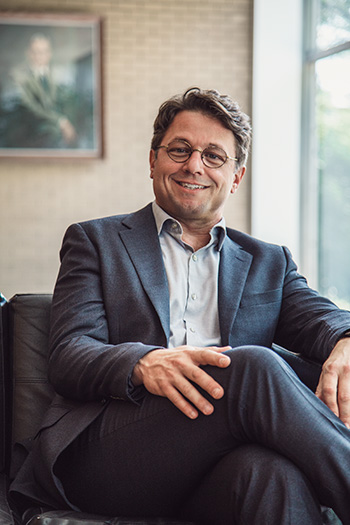
In the spring, air pollution in Seoul, Korea, often exceeds the World Health Organization’s recommended levels—a problem that is regularly attributed to pollution that originates in China and blows across international boundaries. Matthew Shapiro, an associate professor of political science at Illinois Tech’s Lewis College of Human Sciences and research affiliate at Argonne National Laboratory’s Joint Center for Energy Storage Research (JCESR), doesn’t think the phenomenon is explained quite so easily.
Shapiro’s research is primarily focused on science and technology policies and environmental politics in the Northeast Asia region. “These dovetail given that if you have science and technology policy that focuses on green research and development you get outcomes that are desirable,” he says. “I’m also studying the politics of those same issues, because they’re very controversial. We’re all aware of the divisive nature of climate-change science, especially in this country. What I am also doing is looking at the politicization of science and the way that it’s portrayed in the media and online.”
His study of environmental politics in Asia focuses on transboundary pollution and pollution havens. Transboundary pollution describes pollution produced in one country that crosses borders into a neighboring country, for example, yellow dust originating in the deserts of Mongolia and northern China that’s carried south and east by prevailing winds throughout Asia, and even as far as the West Coast of the United States. Pollution havens are countries with lax environmental laws that attract foreign manufacturing but produce a higher proportion of pollution than their regional neighbors as a result.

“China is everyone’s manufacturing center these days. So if the pollution is blowing out of China, it can’t strictly be Chinese firms,” says Shapiro. “There has to be some relation to Korea, Japan, and the United States. These countries represent about half of all foreign direct investment in China.”
“That problem is also politicized,” he says. “The previous president of Korea was really on board with green research and development but the current president is not. I’m researching the international political economy of the region to determine how Korea is contributing to its own pollution by exporting its manufacturing to China.”
Shapiro was named a 2015–16 U.S.-Korea NextGen Scholar for the Center for Strategic and International Studies and received an Asiatic Research Institute Research Fellowship from Korea University in 2014. He recently received an EHWA (Ewha Womans University)-Korean American Communication Association Research Award for his work on yellow dust pollution in Korea.
At JCESR, he is involved in next-generation battery-storage research. At the end of the five-year project JCESR will have generated batteries that are ready to be commercialized. Shapiro is analyzing the collaboration in research and development between government, private companies, and research institutions. He presented a paper on this subject at the 2016 Triple Helix Conference in September.
“Science and technology isn’t just science and technology anymore,” he says. “It used to be. The current focus brings in politics and environmental issues more centrally.”
More Online
“Combatting Yellow Dust and Air Pollution”: http://keia.org/podcast/combatting-yellow-dust-and-air-pollution
JCESR: www.jcesr.org